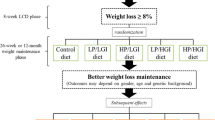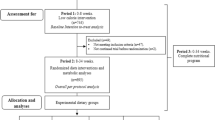Abstract
Purpose of Review
High-protein diets in the management of obesity have been around for many years and have been rigorously tested for their ability to induce weight loss. Comparably less is known about their effects on the maintenance of lost weight.
Recent Findings
Several small and a few large randomized trials have evaluated the efficacy of high-protein diets (20–35% of calories from protein; 1.2–1.9 g/kg∙day) compared with normal-protein diets (10–20% of calories from protein; 0.8–1.3 g/kg∙day), consumed mostly ad libitum during weight loss maintenance, i.e., after clinically significant weight loss. Most of these studies indicate that weight regain in the short term (3–12 months) is lower by 1–2 kg with high-protein diets than low-protein diets. This effect is attenuated with longer periods of observation, likely because of decreasing dietary compliance.
Summary
In line with findings during the active weight loss phase, studies assessing the efficacy of protein-rich diets to improve weight loss maintenance report beneficial effects in the short term, which nevertheless dissipate over time.
Similar content being viewed by others
References
Papers of particular interest, published recently, have been highlighted as: • Of importance •• Of major importance
Bray GA, Siri-Tarino PW. The role of macronutrient content in the diet for weight management. Endocrinol Metab Clin N Am. 2016;45:581–604. https://doi.org/10.1016/j.ecl.2016.04.009.
Mozaffarian D, Rosenberg I, Uauy R. History of modern nutrition science-implications for current research, dietary guidelines, and food policy. BMJ. 2018;361:k2392. https://doi.org/10.1136/bmj.k2392.
Komlos J, Brabec M. The trend of BMI values of US adults by centiles, birth cohorts 1882–1986. NBER Working Paper. No 16252. 2010.
Komlos J, Brabec M. The trend of mean BMI values of US adults, birth cohorts 1882-1986 indicates that the obesity epidemic began earlier than hitherto thought. Am J Hum Biol. 2010;22:631–8. https://doi.org/10.1002/ajhb.21055.
Franz MJ, Boucher JL, Rutten-Ramos S, VanWormer JJ. Lifestyle weight-loss intervention outcomes in overweight and obese adults with type 2 diabetes: a systematic review and meta-analysis of randomized clinical trials. J Acad Nutr Diet. 2015;115:1447–63. https://doi.org/10.1016/j.jand.2015.02.031.
Franz MJ, VanWormer JJ, Crain AL, Boucher JL, Histon T, Caplan W, et al. Weight-loss outcomes: a systematic review and meta-analysis of weight-loss clinical trials with a minimum 1-year follow-up. J Am Diet Assoc. 2007;107:1755–67. https://doi.org/10.1016/j.jada.2007.07.017.
Greenberg I, Stampfer MJ, Schwarzfuchs D, Shai I, Group D. Adherence and success in long-term weight loss diets: the dietary intervention randomized controlled trial (DIRECT). J Am Coll Nutr. 2009;28:159–68. https://doi.org/10.1080/07315724.2009.10719767.
Dansinger ML, Gleason JA, Griffith JL, Selker HP, Schaefer EJ. Comparison of the Atkins, Ornish, weight watchers, and zone diets for weight loss and heart disease risk reduction: a randomized trial. JAMA. 2005;293:43–53. https://doi.org/10.1001/jama.293.1.43.
Sacks FM, Bray GA, Carey VJ, Smith SR, Ryan DH, Anton SD, et al. Comparison of weight-loss diets with different compositions of fat, protein, and carbohydrates. N Engl J Med. 2009;360:859–73. https://doi.org/10.1056/NEJMoa0804748.
Wilson B. Protein mania: the rich world’s new diet obsession. The Guardian. 2019. https://www.theguardian.com/news/2019/jan/04/protein-mania-the-rich-worlds-new-diet-obsession.
Johnston BC, Kanters S, Bandayrel K, Wu P, Naji F, Siemieniuk RA, et al. Comparison of weight loss among named diet programs in overweight and obese adults: a meta-analysis. JAMA. 2014;312:923–33. https://doi.org/10.1001/jama.2014.10397.
Lepe M, Bacardi Gascon M, Jimenez CA. Long-term efficacy of high-protein diets: a systematic review. Nutr Hosp. 2011;26:1256–9. https://doi.org/10.1590/S0212-16112011000600010.
Nordmann AJ, Nordmann A, Briel M, Keller U, Yancy WS Jr, Brehm BJ, et al. Effects of low-carbohydrate vs low-fat diets on weight loss and cardiovascular risk factors: a meta-analysis of randomized controlled trials. Arch Intern Med. 2006;166:285–93. https://doi.org/10.1001/archinte.166.3.285.
Clifton PM, Condo D, Keogh JB. Long term weight maintenance after advice to consume low carbohydrate, higher protein diets--a systematic review and meta analysis. Nutr Metab Cardiovasc Dis. 2014;24:224–35. https://doi.org/10.1016/j.numecd.2013.11.006.
• Pascual RW, Phelan S, La Frano MR, Pilolla KD, Griffiths Z, Foster GD. Diet quality and micronutrient intake among long-term weight loss maintainers. Nutrients. 2019;11:3046. https://doi.org/10.3390/nu11123046An observational study that shows that individuals who are succesful in maintaining clinically significant weight loss in the long term (on average, 29.7 kg for 3.4 years) consume a diet which is relatively rich in protein and carbohydrate and relatively poor in dietraty fat, compared with a control group of subject with obesity.
Westerterp-Plantenga MS, Lejeune MP, Nijs I, van Ooijen M, Kovacs EM. High protein intake sustains weight maintenance after body weight loss in humans. Int J Obes Relat Metab Disord. 2004;28:57–64. https://doi.org/10.1038/sj.ijo.0802461.
Hursel R, Westerterp-Plantenga MS. Green tea catechin plus caffeine supplementation to a high-protein diet has no additional effect on body weight maintenance after weight loss. Am J Clin Nutr. 2009;89:822–30. https://doi.org/10.3945/ajcn.2008.27043.
Lejeune MP, Kovacs EM, Westerterp-Plantenga MS. Additional protein intake limits weight regain after weight loss in humans. Br J Nutr. 2005;93:281–9. https://doi.org/10.1079/bjn20041305.
•• Kjolbaek L, Sorensen LB, Sondertoft NB, Rasmussen CK, Lorenzen JK, Serena A, et al. Protein supplements after weight loss do not improve weight maintenance compared with recommended dietary protein intake despite beneficial effects on appetite sensation and energy expenditure: a randomized, controlled, double-blinded trial. Am J Clin Nutr. 2017;106:684–97. https://doi.org/10.3945/ajcn.115.129528A well-conducted randomized controlled trial of protein supplementation during weight loss maintenance. Results showed that protein supplementation over 6 months did not affect changes in body weight and body composition compared with normal protein intake, even though it increased postprandial thermogenesis and augmented appetite.
Larsen TM, Dalskov SM, van Baak M, Jebb SA, Papadaki A, Pfeiffer AF, et al. Diets with high or low protein content and glycemic index for weight-loss maintenance. N Engl J Med. 2010;363:2102–13. https://doi.org/10.1056/NEJMoa1007137.
Aller EE, Larsen TM, Claus H, Lindroos AK, Kafatos A, Pfeiffer A, et al. Weight loss maintenance in overweight subjects on ad libitum diets with high or low protein content and glycemic index: the DIOGENES trial 12-month results. Int J Obes. 2014;38:1511–7. https://doi.org/10.1038/ijo.2014.52.
Claessens M, van Baak MA, Monsheimer S, Saris WH. The effect of a low-fat, high-protein or high-carbohydrate ad libitum diet on weight loss maintenance and metabolic risk factors. Int J Obes. 2009;33:296–304. https://doi.org/10.1038/ijo.2008.278.
Delbridge EA, Prendergast LA, Pritchard JE, Proietto J. One-year weight maintenance after significant weight loss in healthy overweight and obese subjects: does diet composition matter? Am J Clin Nutr. 2009;90:1203–14. https://doi.org/10.3945/ajcn.2008.27209.
Ebbeling CB, Swain JF, Feldman HA, Wong WW, Hachey DL, Garcia-Lago E, et al. Effects of dietary composition on energy expenditure during weight-loss maintenance. JAMA. 2012;307:2627–34. https://doi.org/10.1001/jama.2012.6607.
McDermid E. Mixed results from the diabetes prevention PREVIEW project. Springer Healthcare, 2018. https://diabetes.medicinematters.com/diabetes-prevention/diet/mixed-results-from-the-diabetes-prevention-preview-project/16185084.
• Christensen P, Meinert Larsen T, Westerterp-Plantenga M, Macdonald I, Martinez JA, Handjiev S, et al. Men and women respond differently to rapid weight loss: Metabolic outcomes of a multi-centre intervention study after a low-energy diet in 2500 overweight, individuals with pre-diabetes (PREVIEW). Diabetes Obes Metab. 2018;20:2840–51. https://doi.org/10.1111/dom.13466A description of the results of the initial weight loss phase of the PREVIEW trial; the largest randomized study on the effects of protein supplementation on weight loss maintenance.
Pesta DH, Samuel VT. A high-protein diet for reducing body fat: mechanisms and possible caveats. Nutr Metab (Lond). 2014;11:53. https://doi.org/10.1186/1743-7075-11-53.
Westerterp-Plantenga MS, Nieuwenhuizen A, Tome D, Soenen S, Westerterp KR. Dietary protein, weight loss, and weight maintenance. Annu Rev Nutr. 2009;29:21–41. https://doi.org/10.1146/annurev-nutr-080508-141056.
Westerterp-Plantenga MS, Lemmens SG, Westerterp KR. Dietary protein - its role in satiety, energetics, weight loss and health. Br J Nutr. 2012;108(Suppl 2):S105–12. https://doi.org/10.1017/S0007114512002589.
Tappy L. Thermic effect of food and sympathetic nervous system activity in humans. Reprod Nutr Dev. 1996;36:391–7. https://doi.org/10.1051/rnd:19960405.
Westerterp KR, Wilson SA, Rolland V. Diet induced thermogenesis measured over 24h in a respiration chamber: effect of diet composition. Int J Obes Relat Metab Disord. 1999;23:287–92. https://doi.org/10.1038/sj.ijo.0800810.
Weigle DS, Breen PA, Matthys CC, Callahan HS, Meeuws KE, Burden VR, et al. A high-protein diet induces sustained reductions in appetite, ad libitum caloric intake, and body weight despite compensatory changes in diurnal plasma leptin and ghrelin concentrations. Am J Clin Nutr. 2005;82:41–8. https://doi.org/10.1093/ajcn.82.1.41.
Leaf A, Antonio J. The effects of overfeeding on body composition: the role of macronutrient composition - a narrative review. Int J Exerc Sci. 2017;10:1275–96.
Webb P, Annis JF. Adaptation to overeating in lean and overweight men and women. Hum Nutr Clin Nutr. 1983;37:117–31.
Antonio J, Peacock CA, Ellerbroek A, Fromhoff B, Silver T. The effects of consuming a high protein diet (4.4 g/kg/d) on body composition in resistance-trained individuals. J Int Soc Sports Nutr. 2014;11:19. https://doi.org/10.1186/1550-2783-11-19.
Miller DS, Mumford P. Gluttony. 1. An experimental study of overeating low- or high-protein diets. Am J Clin Nutr. 1967;20:1212–22. https://doi.org/10.1093/ajcn/20.11.1212.
Bray GA, Smith SR, de Jonge L, Xie H, Rood J, Martin CK, et al. Effect of dietary protein content on weight gain, energy expenditure, and body composition during overeating: a randomized controlled trial. JAMA. 2012;307:47–55. https://doi.org/10.1001/jama.2011.1918.
Author information
Authors and Affiliations
Corresponding author
Ethics declarations
Conflict of Interest
The author declares that he has no conflict of interest.
Additional information
Publisher’s Note
Springer Nature remains neutral with regard to jurisdictional claims in published maps and institutional affiliations.
This article is part of the Topical Collection on Metabolism
Rights and permissions
About this article
Cite this article
Magkos, F. Protein-Rich Diets for Weight Loss Maintenance. Curr Obes Rep 9, 213–218 (2020). https://doi.org/10.1007/s13679-020-00391-0
Published:
Issue Date:
DOI: https://doi.org/10.1007/s13679-020-00391-0




